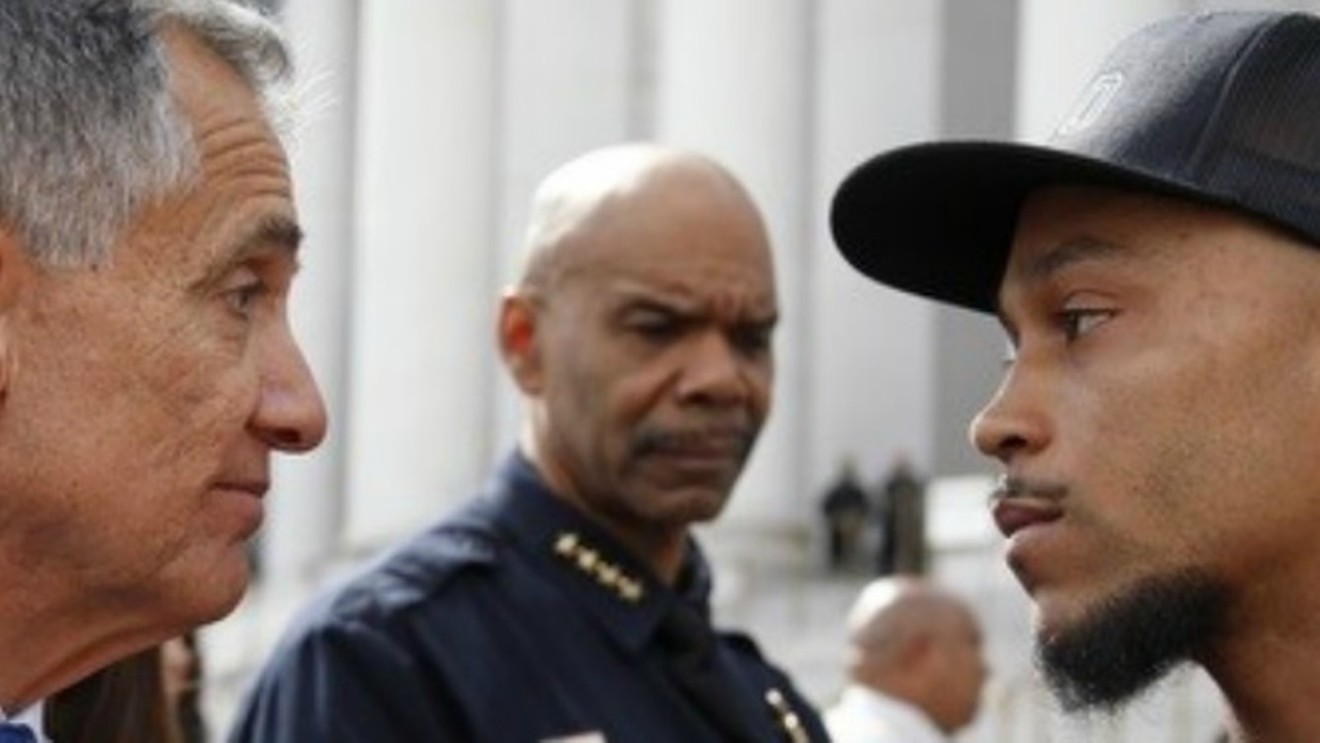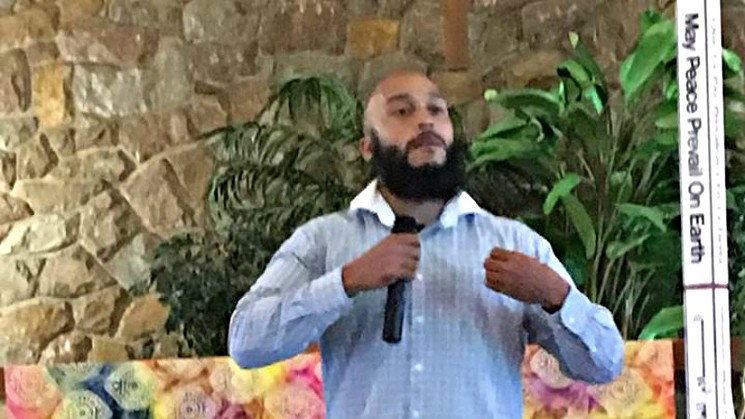"If the new chief really wants to be a chief of reform, he or she should be willing to take on the union," Landau says. "And the community will be behind them in that capacity."
The Denver Police Protective Association, the union in question, has been consistently critical of White, who was hit with a vote of no confidence from the rank and file and multiple calls for his resignation during his tenure. Shortly before White announced his intention to step down, DPPA president Nick Rogers railed against Mayor Michael Hancock's decision to let the chief off with a warning in regard to two internal-affairs investigations over incidents in 2016 and 2017.
Rogers subsequently shared the qualities he'd like to see in the next chief. "I think he or she should already have a tremendous amount of respect from the officers on the job," he told us. "For me, it needs to be someone who has been a good cop and who's been respected for their time out on the streets, or they're respected for their time in their administrative position."
After a rhetorical question ("When they make decisions, are those decisions based on politics, or what's best for the department and its citizens?"), Rogers added, "I'd like someone who is not a politician — someone whose first and foremost concern is the citizens, the officers and making sure that crime is addressed properly. Politics has no business in that spot."
In the months after he took over as chief, White angered many of his charges through departmental restructuring. In February 2012, he announced that he was eliminating the rank of division chief and two of four deputy chief positions — a move that forced some supervisors to reapply for commander jobs. In addition, he announced that units such as public nuisance and abatement, photo radar, the crisis intervention team, computer crime, the identification section and more could be "fully or partially civilianized over time."
But as the years wore on, White seemed more reluctant to make substantive changes recommended by reformers and, on several occasions, failed to move forward until criticism from officials and the public essentially forced him to do so. In June 2015, for instance, the DPD finally changed its policy toward allowing officers to shoot into moving vehicles, but only after the Denver District Attorney's Office chose not to criminally charge the cops who killed seventeen-year-old Jessica Hernandez earlier that year in an incident that might not have happened if different rules had been in place. And White later balked at ordering sergeants and off-duty officers to wear body cameras before belatedly capitulating.

A painting by Theresa BrownGold of Alex Landau juxtaposes his photo after his 2009 police beating with a more recent image.
Facebook
Landau's personal relationship with White got off to a rocky start.
"When Chief White first came to the department back in 2011, my personal case was still under way in relation to the internal investigation to determine if the officers involved would be disciplined," he recalls. "And he asked me to participate in a reenactment of events that occurred on the night when I was racially profiled and nearly killed. To me, that showed a total disregard to the trauma and anxiety that I had endured, and I declined to participate in that effort."
In the years since then, however, Landau says he's seen White "change and grow a lot, and I've developed a good working relationship with him. I wasn't necessarily sure that would be a possibility."
He admits that "I'm a little disappointed we haven't seen a finalized copy of the use-of-force policy that myself and others in the community have spent a significant amount of time diligently working on. From what I understand, the chief wants to wrap that up before he leaves. But he also seems to realize that we need to collect data based on age, race and different demographics every time there's an officer contact, whether it's a simple traffic stop or a conversation on foot."
Indeed, a presentation of a proposed demographic data collection program will be taking place at 6 p.m. tonight at Denver Park Hill Seventh-Day Adventist Church, 3385 Albion Street. That's good news from Landau's perspective. "Those two things should move us in a better direction," he says. "We really ought to be influencing our officers to use practices that diverge away from arrests when we're trying to enhance public safety and avoid other problems that we see in our criminal justice system."
At the same time, Landau notes that "there have still been numerous incidents in brutality that have taken place since he became chief, some that even resulted in a loss of life. And there have been some very large civil settlements that have come out of misconduct at the hands of the Denver police during his time with the department."
Equally frustrating for Landau is the fact that many officers whose alleged misdeeds have cost taxpayers millions remain on the job — though he doesn't hold White entirely responsible for that situation. "The chief can only make a recommendation, and then it's relatively out of his hands — there's not a lot more he can do. The larger matrix of the discipline structure in Denver makes it difficult for a police officer to be terminated because they're offered numerous opportunities to appeal."
Moreover, Landau goes on, "the union has continuously backed officers going through the discipline process. That, to me, suggests that they're quite satisfied with the archaic structure of violence in the community and the old-school, let's-get-tough-on-people-of-color approach. No matter who's chosen to be the next chief, we need to make the matrix more effective, because we need to keep the community safe from officers who rely on rules that often will reinstate them back onto the force."
When asked who he'd like to see as the next chief, Landau mentions Paul Pazen, commander at District 1. "I've had experience with Commander Pazen in a variety of capacities, and he's very intrigued by national models that actually reduce violence and is in favor of interactions with people in the community who suffer from substance abuse and behavioral health issues that don't involve arrest. He really believes that to have a better police department and a healthier, safer community, we need to shift the narrative from thinking that the criminal justice system is the only way to go in some of these circumstances."
Those interested in becoming the next Denver police chief were required to apply by May 27. The Police Executive Research Forum (PERF) has been tasked with reviewing their qualifications, and those who pass this stage will be analyzed by a committee appointed by Mayor Hancock that's heavy on the usual suspects; see the complete roster below. Landau would like to see participation from a wider range of Denver residents at the committee level, to be followed by a forum at which even more locals can share their concerns.
"We need more community involvement in who the next chief will be," he maintains. "If there is a process that will allow the public to ask questions of the finalists, I think that would address a lot of the existing tension over this appointment."
Whoever wins must be willing to stand up to Rogers and the DPPA, Landau feels. "When Chief White came to Denver, I don't think he truly understood how influential the Denver police union was, and still is."
Not that he thinks an adversarial relationship is inevitable.
"I wouldn't look at it in the framework of having to wage war with the department," he says. "I'd look at it as trying to keep the department as clean as possible, so officers who go out with the best intentions aren't led into cases of misconduct by their colleagues."
Here are the members of the Denver police chief search committee:
Troy Riggs, Search Committee Chair and Executive Director of Public Safety
Councilwoman Kendra Black, Denver City Council, District 4
Councilman Christopher Herndon, Denver City Council, District 8
Ryan Brackley, Assistant District Attorney, Denver District Attorney’s Office
Technician Tyrone Campbell, Denver Police Department
Linda Childears, President and CEO, Daniels Fund
Stephanie Donner, General Counsel, Galvanize Inc.
Detective Rachel Eid, Denver Police Department
Charlie Garcia, Executive Council Member, Colorado Bar Association Criminal Law Section
Reverend Terrence Hughes, President, Greater Denver Ministerial Alliance
L. Roger Hutson, President and CEO, HRM Resources III, LLC
Gerardo Lopez, Executive Director, Homies Unidos
John McMillian, Founder, Be Better Than Average
Qusair Mohamedbhai, Partner, Rathod Mohamedbhai LLC
Daniel Ramos, Executive Director, One Colorado
Nicole Melaku, Executive Director, Colorado Immigrant Rights Coalition













